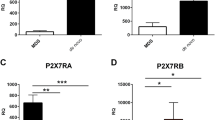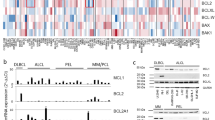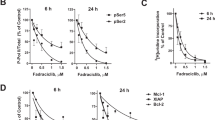Abstract
Binding of agonistic anti-Fas (APO-1/CD95) antibodies or Fas ligand (Fas-L) induces apoptosis in some Fas+ leukemias, and anti-Fas antibody was originally investigated as a possible therapeutic reagent. More recently, a number of studies have examined a potential role for the Fas/Fas-L pathway in chemotherapy-induced apoptosis as well as the effect of Bcl-2 on this pathway. These studies are briefly reviewed here.
This is a preview of subscription content, access via your institution
Access options
Subscribe to this journal
Receive 12 print issues and online access
$259.00 per year
only $21.58 per issue
Buy this article
- Purchase on Springer Link
- Instant access to full article PDF
Prices may be subject to local taxes which are calculated during checkout
Similar content being viewed by others
Author information
Authors and Affiliations
Rights and permissions
About this article
Cite this article
Findley, H., Zhou, M. The clinical significance of Fas expression in leukemia: questions and controversies. Leukemia 13, 147–149 (1999). https://doi.org/10.1038/sj.leu.2401280
Received:
Accepted:
Published:
Issue Date:
DOI: https://doi.org/10.1038/sj.leu.2401280
Keywords
This article is cited by
-
mRNA expression of apoptosis-associated genes in infant acute lymphoblastic leukemia: low Fas expression is an independent predictor for poor prognosis
Leukemia (2004)
-
Monoclonal antibody therapeutics and apoptosis
Oncogene (2003)
-
Stimulation of non-Hodgkin's lymphoma via HVEM: an alternate and safe way to increase Fas-induced apoptosis and improve tumor immunogenicity
Leukemia (2003)
-
The kiss of death: promises and failures of death receptors and ligands in cancer therapy
Leukemia (2001)
-
Non-malignant leukocytes delay spontaneous B-CLL cell apoptosis
Leukemia (2001)



